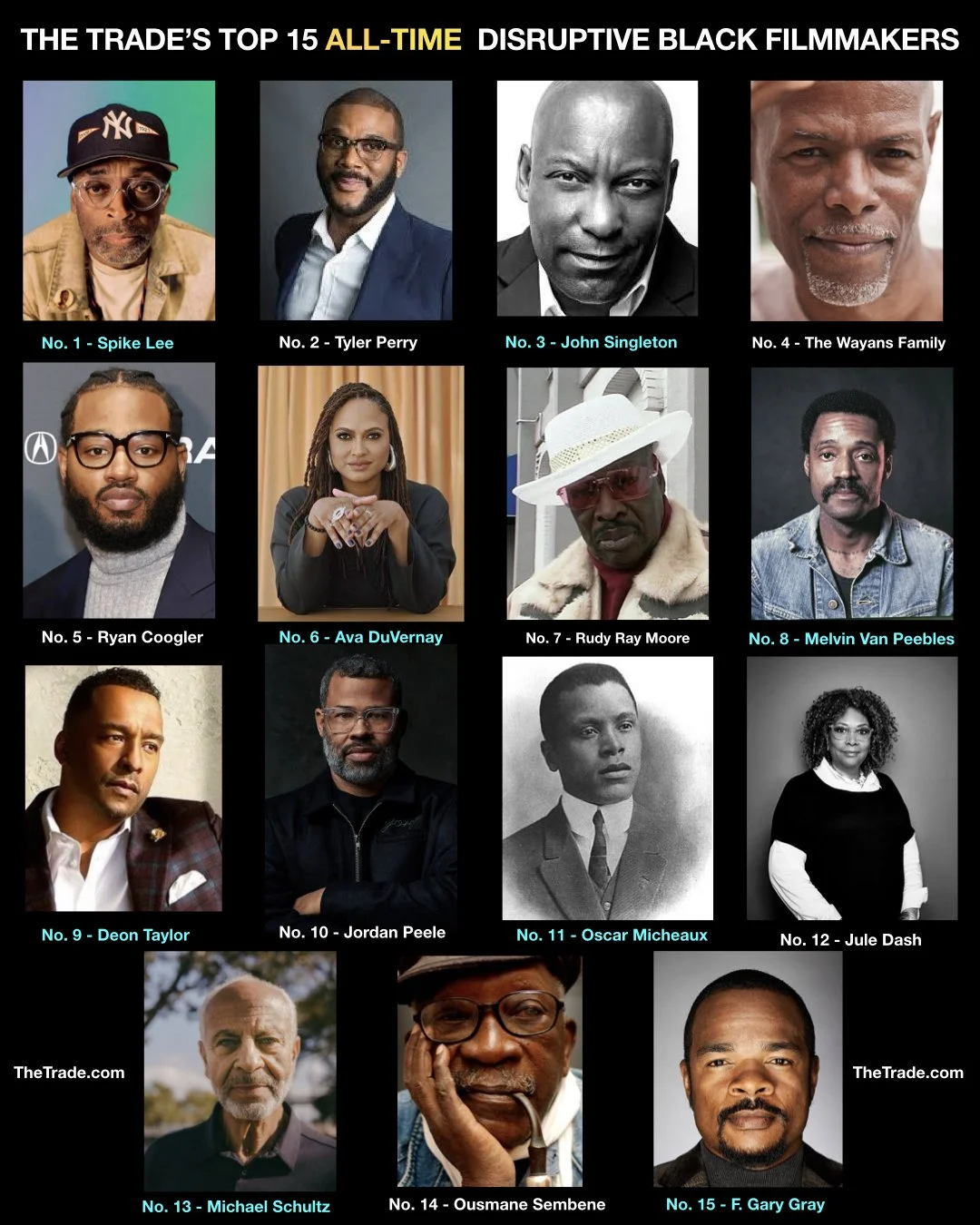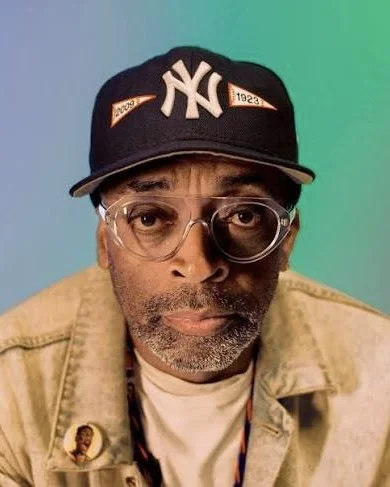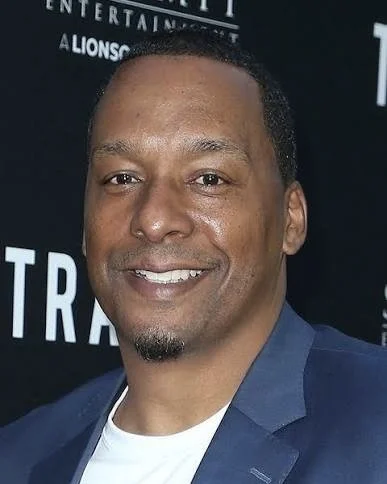THE TRADE PRESENTS: TOP 15 ALL-TIME DISRUPTIVE BLACK FILMMAKERS
They stormed the gates, rewrote the script and left the backdoor wide open. These 15 Black filmmakers turned vision into disruption, and Hollywood’s still taking notes.
1. Spike Lee
Before “diversity” was a Hollywood buzzword, Spike Lee was already doing the work: loud, proud and uncompromising. A cinematic provocateur, Spike disrupted the system with “Do the Right Thing” in 1989, forcing audiences to confront racial tension with a baseball bat of truth. The film became a cultural lightning rod and earned two Oscar nominations. But he didn’t stop there.
From “Malcolm X” to “BlacKkKlansman,” which earned him his long-overdue Oscar), Lee’s 40-year run has mixed social critique with unforgettable style - dolly shots, jazz scores and all.
Spike’s 2018 joint “BlacKkKlansman” grossed over $90 million globally, proving radical storytelling could still pull numbers. He has also been a champion of independent Black cinema, founding 40 Acres and a Mule Filmworks in 1979 and putting Brooklyn - and Black voices - on the global map.
Spike isn’t just a filmmaker. He’s an institution. A disruptor with a lens and a legacy.
2. Tyler Perry
Hollywood said no. So Tyler Perry built his own damn studio.
From sleeping in his car to owning the largest Black-owned studio in U.S. history, Tyler disrupted the system while he creating his own. Dismissed by critics but beloved by audiences, Tyler cracked the code with “Madea” and turned his stage plays into a billion-dollar content machine.
With more than $1.2 billion in box office sales, his hustle is unmatched. And in 2019, he opened Tyler Perry Studios in Atlanta - bigger than Warner Bros., Disney and Paramount combined.
Tyler writes, directs, produces and acts. He’s become a pipeline for Black talent and a blueprint for ownership. Hollywood didn’t give him a seat. He built the damn table, the chairs and a soundstage too.
3. John Singleton
At 24, he shook the Oscars. Then he shook the culture.
John Singleton came out the gate like a cinematic sniper. With “Boyz n the Hood,” he became the first Black and youngest filmmaker ever nominated for Best Director - all before his 25th birthday. The $6 million indie made nearly $60 million and launched a movement. It was a coming-of-age story, which became a cultural awakening wrapped in gunshots, grief and Black genius.
Singleton didn’t flinch. He made films that stared America in the face: “Poetic Justice,” “Higher Learning,” “Baby Boy.” No gloss. No pandering. Just truth. He also helped ignite the careers of Regina King, Ice Cube, Taraji P. Henson, Damson Idris, and left his final mark with “Snowfall,” mentoring a new generation before his untimely passing.
Singleton didn’t just direct movies. He directed the culture.
4. The Wayans Family
Before there was a “multiverse,” there was the Wayans-verse.
Forget just one disruptor, the Wayans turned disruption into a family business. From “In Living Color” to “Scary Movie,” this comedy dynasty broke barriers, busted guts and banked millions while flipping the Hollywood playbook on its head.
“Scary Movie” alone pulled in a staggering $278 million worldwide on a shoestring budget, spawning a franchise and proving that satire sells.
Keenen Ivory kicked open the door, and the rest of the clan — Damon, Shawn, Marlon, Kim — turned it into a revolving platform for Black comedy, culture and commentary. Their sketches entertained the masses, launching launched careers (hi, J.Lo and Jim Carrey) and made Fox must-see TV.
The Wayans never waited for permission. They took parody, slapstick and social critique, then made it fly in Jordans. Their success proved that funny could be fearless, and that Black families could build empires, one joke at a time.
5. Ryan Coogler
The quiet disruptor who made Hollywood roar.
Ryan Coogler doesn’t need to shout. His films do that for him. From the indie punch of “Fruitvale Station” to the billion-dollar impact of “Black Panther” ($1.3 billion worldwide), Coogler is a master of making the personal global and the political blockbuster-worthy.
Coogler rewrote the sports sequel formula with “Creed” ($173 million global, plus spawning its own franchise), transformed Marvel into a celebration of African excellence, and turned grief into gold with “Wakanda Forever.” But his most radical move? Retaining ownership of “Sinners” in the 25 years, marking a rare flex of IP control in a studio-dominated industry.
Beyond directing, Coogler is building a storytelling engine with his production company Proximity Media, empowering fresh voices and keeping the cultural pipeline strong. Whether he’s lifting up communities or honoring his collaborators (RIP Chadwick Boseman), Coogler is the blueprint for impact without compromise. He’s making hits. He’s making legacy.
6. Ava DuVernay
While others pitched for permission, Ava DuVernay flipped the power dynamic and the industry took notes.
The former publicist turned powerhouse director became the first Black woman to helm a $100 million-plus studio film with “A Wrinkle in Time,” and she did it without watering down her voice.
She broke hearts and opened eyes with Selma ($66.8 million worldwide) and “13th” (an Oscar-nominated Netflix doc that redefined mass incarceration discourse). But her most seismic cultural quake? “When They See Us,” which earned 16 Emmy nominations and forced America to reckon with the Central Park Five.
Ava is also the founder of ARRAY, a distribution collective amplifying underrepresented voices and flipping the gatekeeping game on its head. She’s telling stories and curating movements. And in an industry where systemic barriers still choke progress, Ava doesn’t wait for change. She codes it, funds it and films it.
From courtroom dramas to cosmic journeys, she’s proving that Black women can do everything with vision, purpose and power.
7. Rudy Ray Moore
Before viral was a thing, Rudy Ray Moore built a cinematic cult following from scratch, pimp suit and all.
Dubbed the “Godfather of Rap” and the king of Blaxploitation comedy, Moore wrote, produced, starred in and self-distributed his films decades before “indie hustler” was a badge of honor. His alter ego, “Dolemite,” debuted in 1975 with a $100,000 budget and went on to gross more than $12 million, smashing expectations and boundaries with raunchy rhymes and martial arts absurdity.
While critics rolled their eyes, audiences packed theaters, turning Moore into a folk hero of underground cinema. His DIY blueprint influenced everyone from Snoop Dogg to Quentin Tarantino, and his fearless, filthy brand of Black expression carved out a lane for artists who refused to be polite or polished.
Netflix’s “Dolemite Is My Name,” starring Eddie Murphy, brought overdue respect to his legacy, but Rudy had already kicked the door down in platform shoes.
8. Melvin Van Peebles
Before there was indie Black cinema, there was Melvin, flipping studio deals, guerrilla shooting, and middle fingers to the system.
With “Sweet Sweetback’s Baadasssss Song” in 1971, Van Peebles sparked a movement through his filmmaking. Funded partially by a loan from Bill Cosby and starring himself, the film earned a staggering $15 million at the box office off a $150,000 budget.
Studios dismissed it; the Black community turned it into gospel.
Rated X “by an all-white jury,” Sweetback was unapologetic, political and revolutionary - a hero on the run who fought the system and lived. The film inspired the entire Blaxploitation era, and more importantly, taught generations of Black filmmakers that ownership, defiance, and storytelling could all fit in one frame.
Van Peebles wrote, directed, produced, scored, edited and even sold tickets. He rewrote the playbook in his own handwriting, long before Sundance or final cut deals were buzzwords. A true disruptor before disruption was chic.
9. Deon Taylor
Hollywood outsider turned power player, Deon Taylor is building a studio system of his own, brick by brick, with no permission slips needed.
Taylor skipped the greenlight and became the whole traffic signal. With Hidden Empire Film Group, Taylor and producing partner Roxanne Avent Taylor, the tandem has created a self-sustaining machine. He’s directed hit after hit without studio backing. From “Meet the Blacks” and its sequel (“The House Next Door,” starring Mike Epps) to “Fatale” and “Intruder,” his films have grossed nearly $100 million collectively - all outside the traditional system.
Deon’s secret sauce? A smart blueprint of ownership, audience-first storytelling and the audacity to go big without asking for permission. He’s one of the few Black filmmakers thriving in the indie-commercial space, doing high-concept genre work that makes money and keeps control. He collaborates with stars like Hilary Swank, Michael Ealy and even NBA legends like Kevin Garnett on crossover projects.
Taylor is loud about what matters: “Stop asking for seats. Build your own damn table.” That disruptive energy? It’s contagious and quietly shifting the industry.
10. Jordan Peele
Jordan Peele entered the horror genre with a scalpel, slicing it open to inject meaning and menace.
With “Get Out” ($255 million global box office on a $4.5 million budget), he gave Hollywood a masterclass in how race, satire and suspense could collide, and win Oscars. He followed it with “Us” ($256 million) and “Nope” ($172 million), cementing his signature: social thrillers that are as profitable as they are provocative.
Peele made the creepy profitable, and the political palatable.
Through his Monkeypaw Productions banner, Peele’s producing the next wave of boundary-pushing storytellers (“Candyman,” “Lovecraft Country,” “Wendell & Wild”). He’s cultivated a genre all his own, where Blackness has become the engine. A modern Hitchcock with a megaphone, Peele turned fear into fortune while proving that horror isn’t just a scream fest. It can be a statement.
11. Oscar Micheaux
Long before “disruptor” was a buzzword, Oscar Micheaux was living it.
The son of formerly enslaved parents, Micheaux became the first major Black feature filmmaker, directing over 40 films and writing seven novels during an era when Black voices were shut out of Hollywood entirely. His work tackled taboo topics like interracial relationships, systemic racism and Black self-determination, often challenging the sanitized portrayals of race in white-led cinema.
With works like “The Homesteader” in 1919 and “Within Our Gates” the following year, Micheaux offered an unflinching alternative to the racist propaganda of “The Birth of a Nation.” He financed his own projects, booked his own screenings and operated entirely outside the traditional system. His stories gave Black audiences a mirror and a megaphone when both were rare.
Micheaux was ahead of his time, carving the blueprint. His hustle, vision and independence set the stage for a century of disruption. He didn’t just make movies. He made history.
12. Julie Dash
Julie Dash turned whispers into waves with her lyrical landmark film “Daughters of the Dust” in 1991, the first feature by a Black woman to receive a national theatrical release in the U.S. Her voice was original and long overdue. She brought the rich, spiritual world of Gullah women to life with sweeping visuals, nonlinear storytelling and unapologetic Black femininity.
While Hollywood scrambled to define “universal” stories, Dash redefined what it meant to center Black women’s experience on their own terms. “Daughters of the Dust” made history and ignited legacy, influencing everything from Beyoncé’s “Lemonade” to the rise of Southern gothic in Black film.
Dash has remained a quiet force behind the lens, directing for film and TV (“Queen Sugar,” “The Rosa Parks Story”) while paving a road that many now walk. She expanded the industry to fit her style.
Julie Dash disrupted by dreaming in color.
13. Michael Schultz
Before there was a blueprint for mainstream Black cinema, Michael Schultz was busy sketching one. His fingerprints are all over the culture from “Cooley High” in 1975, a coming-of-age classic that laid emotional groundwork for future filmmakers, to “Car Wash” in 1976 and “Which Way Is Up?” in 1977, which proved comedy could be stylish, satirical and Black as hell.
Schultz shaped a visual language for a new generation. “Cooley High” inspired “Boyz n the Hood,” “ATL” and even “Insecure.”
“Car Wash” grossed $20 million (on a $2 million budget) and helped usher in a funky, fresh wave of ensemble storytelling.
Even after decades in the game, Schultz remained active, directing episodes of “Black Lightning,” “Arrow” and “All American.” His range? Impeccable. His legacy? Quietly foundational.
Schultz’s work left a permanent mark. He helped turn Black life into something Hollywood couldn’t ignore: art, joy and box office gold.
14. Ousmane Sembène
Ousmane Sembène carved a path where none existed and made global cinema take notice. Hailing from Senegal, Sembène turned his pen and camera into weapons of truth, rebellion and cultural reclamation. He was unmaking colonial narratives.
His breakout “Black Girl” in 1966 disrupted the European gaze and gave voice to African women silenced by history. Xala, a satirical masterpiece, dragged post-colonial corruption into the light. These were indie darlings and cinematic grenades with global resonance.
Sembène knew that cinema was the most powerful classroom. While Hollywood glamorized revolution, he documented it with grit and elegance. His films were often banned, censored or ignored by the West, which only made his message louder.
Today, Black filmmakers from Ava DuVernay to Raoul Peck trace their cinematic roots back to him. His work gave permission to be political, poetic and proudly African on film, in language and in legacy.
Sembène disrupted cinema and redefined who it could belong to.
15. F. Gary Gray
F. Gary Gray built his career like he directs: sharp, strategic and always with something to prove.
From iconic music videos like Ice Cube’s “It Was a Good Day” to genre-bending films, Gray built a catalog that shook up Hollywood and the box office. His feature debut, “Friday,” became a cultural staple, flipping a low-budget comedy into a $28 million cult classic. Then came “Set It Off,” “The Negotiator” and “Law Abiding Citizen.” Each film expanding his reach without losing his edge.
But it was “Straight Outta Compton” in 2015 that solidified his place in the canon. With over $200 million worldwide, it became one of the highest-grossing musical biopics of all time. Two years later, he helmed The Fate of the Furious, racking up over $1.2 billion globally, making him the first Black director to join the billion-dollar club.
Gray didn’t ask to direct blockbusters. He earned it with vision and velocity. His legacy? Bringing hood classics and high-octane franchises to the same table, and showing that disruption isn’t just about where you start, it’s about how you scale.
















